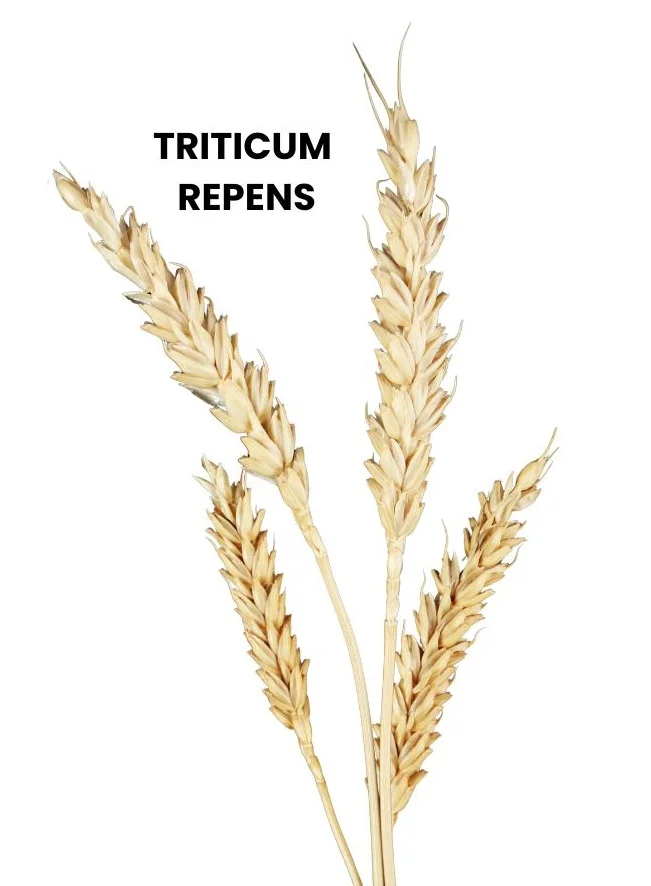Triticum Repens, commonly known as Couch Grass, is a well-known herbal remedy in homeopathy, especially for its beneficial effects on the urinary system.
It is used primarily to treat irritability of the bladder, dysuria (painful or difficult urination), cystitis (bladder inflammation), and even gonorrhoea.
Couch Grass has been traditionally valued for its medicinal properties and has been used as a natural diuretic and anti-inflammatory agent for various ailments, particularly those related to the urinary tract.

SOURCE INFORMATION
Scientific Classification
- Family: Poaceae (Grass family)
- Genus: Triticum (Wheat)
- Species: Triticum repens (also known as Agropyron repens)
- Common Names: Couch Grass, Quack Grass, Dog Grass, Witchgrass
- Native Origin: Triticum repens is native to Europe, Asia, and North Africa but has spread to other parts of the world.
Historical Facts
- Triticum repens has a long history of use in traditional herbal medicine, dating back to ancient Greece and Rome.
- It has been utilized for its diuretic properties, promoting urination and alleviating urinary tract conditions.
- In the past, it was also employed for its demulcent (soothing) effects on irritated mucous membranes and to treat respiratory and digestive issues.
DRUG PATHOGENESIS
- Triticum Repens acts primarily on the urinary system, where it reduces irritation and inflammation of the bladder and urethra.
- It promotes the excretion of waste products through urine, helping to relieve symptoms of dysuria, cystitis, and bladder infections.
- It is also known to relieve symptoms of prostatitis and incontinence in some cases.
- The herb’s soothing and diuretic properties play a crucial role in its ability to address urinary tract irritation and discomfort.
PHYSICAL CONSTITUTION AND DIATHESIS
- Constitution: Suited for individuals prone to urinary tract disorders, particularly those with weak or irritable bladders.
- Diathesis: Primarily indicated for people with chronic bladder or urinary tract conditions, such as frequent infections or inflammation.
TEMPERAMENT
- Nervous or anxious temperaments who are easily aggravated by urinary discomfort.
- People who experience constant bladder irritation and a frequent urge to urinate.
KEY CHARACTERISTICS
- Bladder Irritability: Triticum repens is excellent for treating bladder irritability, where there is frequent and painful urination.
- Chronic Cystitis: It is useful in cases of chronic inflammation of the bladder with catarrhal or purulent discharges.
- Prostatitis: Effective for treating prostate enlargement and irritability associated with urinary symptoms.
- Incontinence: Treats frequent and difficult urination in elderly individuals or those suffering from chronic cystitis.
- Gravelly Deposits: Helps dissolve and flush out gravel (small kidney stones) in the urinary tract.
DETAILED ORGAN SYMPTOMS
URINARY SYSTEM
- Frequent Urination: A constant desire to urinate, accompanied by pain or discomfort.
- Dysuria: Difficulty or pain during urination, often with a burning sensation.
- Cystitis: Inflammation of the bladder, often leading to urinary incontinence and irritation.
- Gravel and Stones: The herb helps in flushing out gravel (small kidney stones) and preventing further stone formation.
- Strangury: Painful and frequent urination with a feeling of incomplete bladder emptying.
- Pyelitis: Inflammation of the renal pelvis (kidney infection) is treated effectively with Couch Grass.
- Prostate Issues: Triticum Repens helps manage urinary symptoms related to prostate enlargement, such as frequent urination or incomplete voiding.
MODALITIES
- Worse: After drinking fluids, during the night, and from exposure to cold.
- Better: Warmth, application of heat, and after urination.
WHAT ARE MODALITIES IN HOMOEOPATHY?
RELATIONSHIP WITH OTHER DRUGS
Compare With,
- Tradescantia: For urinary pain, urethral discharge, and scrotal inflammation.
- Chimaphila, Senecio, Populus tremuloides, Buchu, Uva ursi: All are useful in treating urinary tract symptoms like painful urination, incontinence, and bladder inflammation.
DOSE
- Tincture or Infusion: Boil two ounces of Couch Grass in a quart of water until reduced to a pint.
- Take four doses in 24 hours.
- The infusion is particularly effective for bladder irritation and urinary tract symptoms.
Frequently Asked Questions
What is Couch Grass used for?
- Couch Grass is primarily used for urinary issues like bladder irritation, cystitis, dysuria, and prostatitis.
- It helps relieve pain during urination, flush out small stones, and reduce bladder inflammation.
Can Couch Grass help with kidney stones?
- Yes, Couch Grass helps in flushing out small stones (gravel) from the urinary tract and preventing their formation.
What dose of Couch Grass should I take?
- You can take a tincture or an infusion by boiling two ounces of Couch Grass in a quart of water until reduced to a pint.
- This can be taken in four doses over 24 hours.
Are there any side effects of Couch Grass?
- Couch Grass is generally safe when used as recommended.
- However, excessive consumption can cause diarrhea due to its diuretic effects.
Meaning of Difficult Words
- Dysuria: Painful or difficult urination.
- Cystitis: Inflammation of the bladder.
- Strangury: Painful and frequent urination with a feeling of incomplete bladder emptying.
- Prostatitis: Inflammation of the prostate gland.
- Purulent: Containing or discharging pus.
- Pyelitis: Inflammation of the renal pelvis.
- Gravel: Small stones or mineral deposits in the kidneys or bladder.
